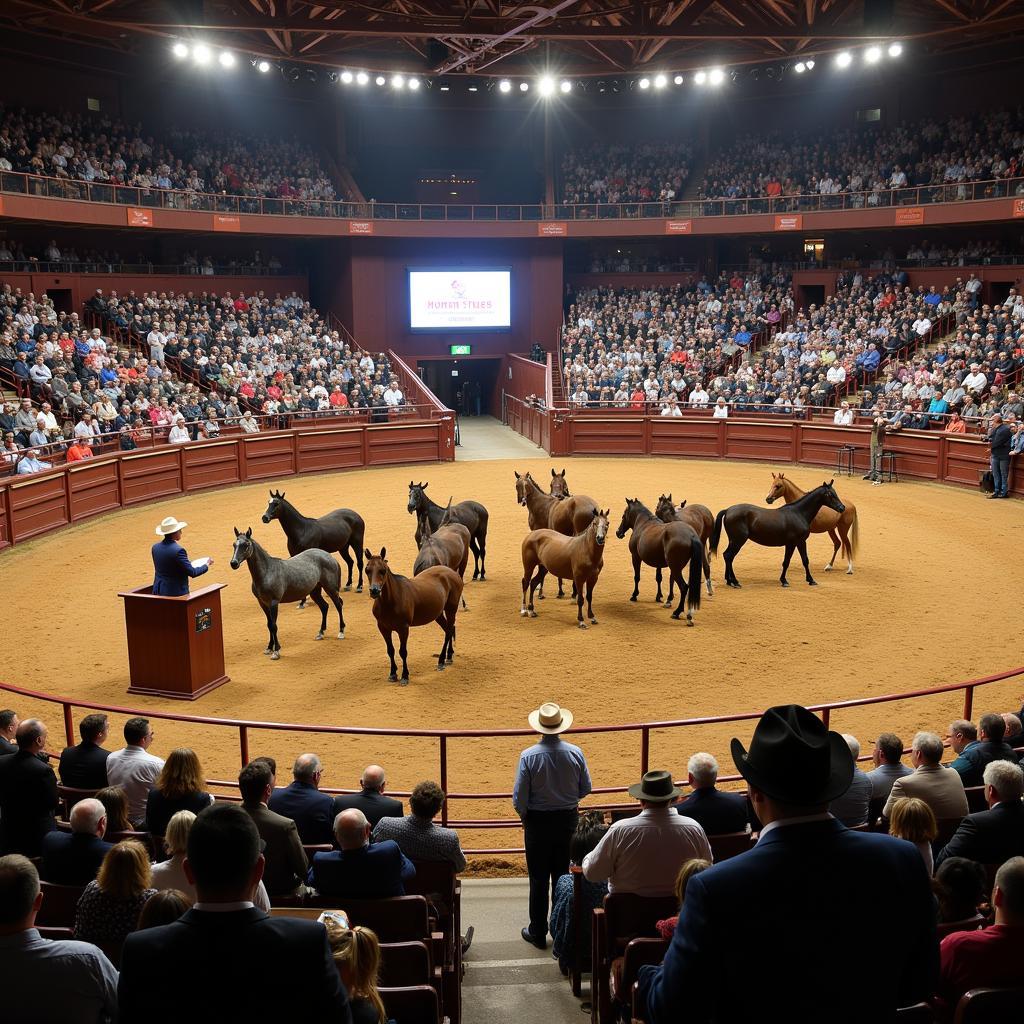Finding the Best Of Texas Horse Sale options can be an exciting but overwhelming experience. Whether you’re a seasoned equestrian or a first-time buyer, navigating the Texas horse market requires careful consideration and research. This guide will provide you with valuable insights and expert advice to help you find the perfect equine partner in the Lone Star State.
Texas boasts a rich equestrian heritage, and the state’s horse sales reflect this diverse landscape. From cutting horses and barrel racers to ranch horses and pleasure mounts, you can find a wide variety of breeds and disciplines represented at Texas horse sales. Understanding your needs, setting a budget, and conducting thorough research are crucial steps in finding the right horse for you. Looking for specific breeds like Friesians or Gypsy Vanners? Check out our dedicated pages for friesian horse for sale in texas and gypsy vanner horses for sale in texas.
Understanding the Best of Texas Horse Sale Landscape
The Texas horse market is vibrant, with sales happening year-round. These sales range from small, private transactions to large, public auctions. Knowing the different types of sales can help you target your search. Private treaty sales offer a more personalized experience, while auctions provide a larger selection and competitive bidding.
Navigating Different Types of Horse Sales
- Private Treaty Sales: These sales are conducted directly between the buyer and seller. This allows for more in-depth conversations about the horse’s history, temperament, and training.
- Auction Sales: Auctions offer a wide variety of horses, often with lower starting prices. However, the competitive bidding process can drive prices up quickly.
- Consignment Sales: Consignment sales involve a third party who manages the sale process for the seller. This can provide a level of objectivity and expertise.
 Texas Horse Sale Auction: A bustling scene with horses being presented to potential buyers.
Texas Horse Sale Auction: A bustling scene with horses being presented to potential buyers.
Preparing for the Best of Texas Horse Sale
Before attending a best of Texas horse sale, it’s important to be prepared. This includes setting a realistic budget, determining your riding goals, and creating a checklist of essential qualities you’re looking for in a horse.
Key Considerations Before Buying a Horse
- Budget: Consider not only the purchase price but also the ongoing costs of horse ownership, including feed, veterinary care, and farrier services.
- Riding Discipline: The type of riding you plan to do will greatly influence the breed and training level of the horse you choose.
- Experience Level: Be honest about your riding abilities and choose a horse that matches your skill level.
- Temperament: Look for a horse with a temperament that complements your personality and riding style.
Evaluating Horses at a Sale
Once you’re at a sale, evaluating horses requires a keen eye and attention to detail. Observe the horse’s conformation, movement, and temperament. If possible, ask for a pre-purchase veterinary examination to assess the horse’s overall health and soundness. Make sure you also consider the right equipment, like a good hay net. Check out our guide on the best hay net for horses.
Assessing a Horse’s Suitability
- Conformation: Look for a well-balanced physique with correct leg and hoof structure.
- Movement: Observe the horse’s gait at a walk, trot, and canter, looking for fluidity and soundness.
- Temperament: Pay attention to the horse’s demeanor and how it interacts with people and other horses.
Ensuring a Smooth Transaction
Once you’ve found the perfect horse, ensure a smooth transaction by having a legally sound purchase agreement. This protects both the buyer and seller and outlines the terms of the sale. If you’re looking to transport your new horse, consider reputable horse trailer brands to avoid potential issues. Or maybe you need a new trailer altogether? We have a guide on living quarter horse trailers for sale in texas as well!
Finalizing the Purchase
- Purchase Agreement: A written contract should outline the purchase price, payment terms, and any warranties or guarantees.
- Pre-Purchase Exam: A veterinary exam provides valuable information about the horse’s health and can help you make an informed decision.
- Transportation: Arrange for safe and reliable transportation for your new horse.
Conclusion
Finding the best of Texas horse sale opportunities and selecting the perfect equine partner requires careful planning, research, and evaluation. By following the tips outlined in this guide, you can navigate the Texas horse market with confidence and find the horse of your dreams. Remember to consider your individual needs and prioritize a horse’s health and temperament to ensure a long and fulfilling partnership.
FAQ:
- What is the average price of a horse in Texas? Horse prices vary widely depending on breed, age, training, and discipline.
- When are the best times to attend horse sales in Texas? Horse sales occur throughout the year, but spring and fall are often popular seasons.
- What should I look for in a pre-purchase exam? A pre-purchase exam should assess the horse’s overall health, soundness, and suitability for your intended use.
- Do I need a lawyer to review a horse purchase agreement? While not always required, consulting with a lawyer can protect your interests.
- What are some common horse breeds found in Texas? Quarter Horses, Paint Horses, and Appaloosas are among the common breeds in Texas.
- How do I find reputable horse sellers in Texas? Seek recommendations from experienced equestrians, veterinarians, and trainers.
- What are the ongoing costs of owning a horse in Texas? Ongoing costs include feed, farrier services, veterinary care, and boarding or stable fees.
Need more help? Contact us at Phone: 0772127271, Email: [email protected] or visit us at QGM2+WX2, Vị Trung, Vị Thuỷ, Hậu Giang, Việt Nam. We have a 24/7 customer service team ready to assist you.